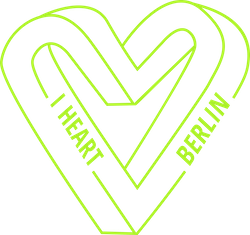Treptow-Köpenick
photo: Linka A. Odom
I ride on over the bridge. To my left, Jonathan Borofsky’s Molecule Man – three massive walking figures on the River Spree, approaching from Alt-Treptow, Rummelsburg and Friedrichshain, melding to one in the middle of the river between the East Side Gallery and the Allianz building. The sun is setting just behind them. I switch up a gear and lean into the handlebars, race through Friedrichshain to Prenzlauer Berg where the reading is being held at Rosa-Luxemburg-Platz. It turns out I’m one of the first to arrive. I stand at the end of the bar, smoke and drink alcohol-free beer. The place fills slowly, but there’s no one I know, until… though I don’t recognize him at first – probably down to what he’s wearing: three-quarter-length flared trousers, high boots in soft leather and a tight black top with a low neckline revealing a rather hairy chest where I might otherwise have expected cleavage – shit, what’s his name. ‘Hello,’ he says. I tell him I’m sorry I’ve forgotten his name. ‘Martin.’ He’s got a deep voice and a thick Scouse accent.
‘You’re looking rather different this evening.’
‘Yeah,’ he says casually and laughs. ‘I like to mix up.’
Last time I saw him – at a concert – he was wearing a black bomber jacket, jeans and training shoes. I ask him if this is a regular thing.
‘What? Oh, you mean the dressing up? Just whenever I feel like it.’
There’s a sprinkling of stubble on his strong jaw. He makes no effort to talk, walk or otherwise act like a woman. Just the clothes. That makes me curious and I want to ask him some questions.
‘Sure, fair dues, mate.’ We talk a little bit. ‘It doesn’t mean I’m gay or anything, though most people… Most people are just fucking wrong. It’s fun to dress up, that’s all there is to it.’ Does he get trouble sometimes? He nods. ‘Not so much here. More at home. This area’s fine. Kreuzberg’s okay too. Neukölln is dodgy.’ He points to his front teeth.
‘Just got those repaired.’
‘What?’ I wince.
‘Amazing dentists in Germany,’ he adds.
I ask him what he thinks about Treptow. ‘Wouldn’t go there, man. Not dressed like this, anyway.’ I ask him where he works. ‘I’m on the dole.’
I realize, all at once, that I’ve forgotten to phone Jude. He’ll already be on his way to meet me, and the reading hasn’t even started yet. I’m going to have to give it a miss.
So I’m back on my bike, headed for Köpenick. It’s getting dark, and I switch my lights on. The wind blows against my face. I ride under one of Ostkreuz’s many railway bridges. I’m outside of the circular line now, just entering Treptow, where the price of rent begins to drop. I continue up the main road alongside an endless row of restored and renovated red-brick buildings, following the tramline that takes me to Schöneweide. Vandalized hulks of bygone industry stand in disrepair. Generous gaps between them offer glimpses of the dark, still river. A late-shift workman stands in a window of an early 1900s building. Cost a pretty penny, that will. Then for a long time, there’s nothing, nothing and nothing; wasteland and woodland take turns at being nothing. I approach the electricity works. Dark brick in the speeding dark with long, vertical windows like a gothic church; but there’s no stained glass, no archways and no, no God. Stringent rigidity. Grimly magnetic. The only bars are iron ones, vainly defending the ruins from vandals. Boarded-up shutters, greyed-out façades of prefab. The fences are makeshift: holes are filled with reinforcing steel mats.
I rattle over tram tracks: a sign says ‘Schöneweide’.
Jude’s local pub is one of those territorial bars where you rarely see anyone under forty. The regulars are real regulars, reliable as the sun whether it’s Saturday night or Monday morning. The tables outside are unoccupied, except for Jude who’s Skyping with his sister, a glass of tap water before him. He doesn’t like being inside. Too smoky.
It’s cold and I’m sweating from cycling. I ask him if we can go in, and he nods. It’s a dingy sports bar with flashing lights, a dartboard and fruit machines. Digital noises point out the winners and losers. An aging Henry Winkler stands at the bar, moving to the ’80s music. Not the nightlife Jude had expected when he came to Berlin. I order a beer. ‘Bit of a dive, eh?’ I say. Jude’s agreement is tentative. He was a little apprehensive at first, but it’s got a community feeling about it: a closed community for killing time, shallow talk, football, drinking. Two guys come over and knock on our table, greeting Jude as they do so. He’s obviously well accepted here. The customers and the bar staff seem to be interchangeable. Sometimes they’ll be standing behind the bar, sometimes sitting in front of it, heads bowed like stray dogs. ‘We’re all just stray dogs in a way,’ says Jude, as if he’s just read my thoughts, ‘trying to interpret the world.’ We sit in silence a while, then he says, ‘By the way, I found a flat. Well, a flat-share. But,’ he raises a finger, ‘wait for it. I’m sharing with nineteen other folk.’
‘What? How big is it?’
‘Three rooms.’
‘How much?’
‘Two hundred and twenty.’
‘Are you serious?’
He nods. ‘Yeah. Straight up. Twenty people in bunk beds.’
I shake my head in disbelief. It’s a rip off.
* * *
This is an excerpt from Joseph Givens essay on Treptow-Köpenick. Read the full version and more stories of Letters from Berlin here.


